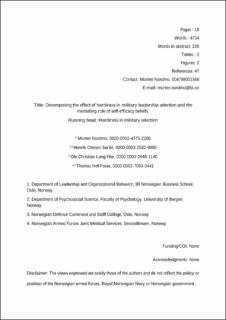| dc.contributor.author | Nordmo, Morten | |
| dc.contributor.author | Sørlie, Henrik | |
| dc.contributor.author | Lang-Ree, Ole Christian | |
| dc.contributor.author | Fosse, Thomas Hol | |
| dc.date.accessioned | 2022-12-29T13:40:17Z | |
| dc.date.available | 2022-12-29T13:40:17Z | |
| dc.date.created | 2022-04-22T10:51:19Z | |
| dc.date.issued | 2022 | |
| dc.identifier.issn | 0899-5605 | |
| dc.identifier.uri | https://hdl.handle.net/11250/3039908 | |
| dc.description.abstract | Psychological hardiness is a set of personality characteristics that is linked to better health, performance, and leadership in demanding environments. Research indicates that candidates who score high on hardiness have an advantage during military leadership selection. In this study, we deconstruct the effect of hardiness into three separate measures of leadership performance: interview performance, field performance, and the probability of voluntary withdrawal from a challenging field exercise. Additionally, we hypothesize that the dispositional effect of hardiness is partly due to an indirect effect of contextual self-efficacy beliefs regarding military leadership ability. We test our hypotheses in a sample of candidates seeking admission to officer training in the Norwegian Armed Forces during a three-week selection process. The results confirm that hardiness was associated with successful admission and showed that hardy candidates scored somewhat higher on the interview and field exercises and were notably less likely to drop out of the field exercise. Using generalized structural equation modeling and mediation analysis, we find that the effect is partly mediated by self-efficacy beliefs, but the direct effect of hardiness is more pronounced than the indirect effect of self-efficacy. Overall, the results add to the growing body of hardiness as a predictor of military leadership performance and shows that this advantage is partly, but not primarily associated with contextual self-efficacy beliefs. | en_US |
| dc.language.iso | eng | en_US |
| dc.publisher | Taylor & Francis | en_US |
| dc.title | Decomposing the effect of hardiness in military leadership selection and the mediating role of self-efficacy beliefs | en_US |
| dc.type | Journal article | en_US |
| dc.type | Peer reviewed | en_US |
| dc.description.version | acceptedVersion | en_US |
| dc.rights.holder | Copyright 2022 Division 19 (Society for Military Psychology) of the American Psychological Association | en_US |
| cristin.ispublished | true | |
| cristin.fulltext | postprint | |
| cristin.qualitycode | 1 | |
| dc.identifier.doi | 10.1080/08995605.2022.2054658 | |
| dc.identifier.cristin | 2018360 | |
| dc.source.journal | Military Psychology | en_US |
| dc.source.pagenumber | 697-705 | en_US |
| dc.identifier.citation | Military Psychology. 2022, 34 (6), 697-705. | en_US |
| dc.source.volume | 34 | en_US |
| dc.source.issue | 6 | en_US |
